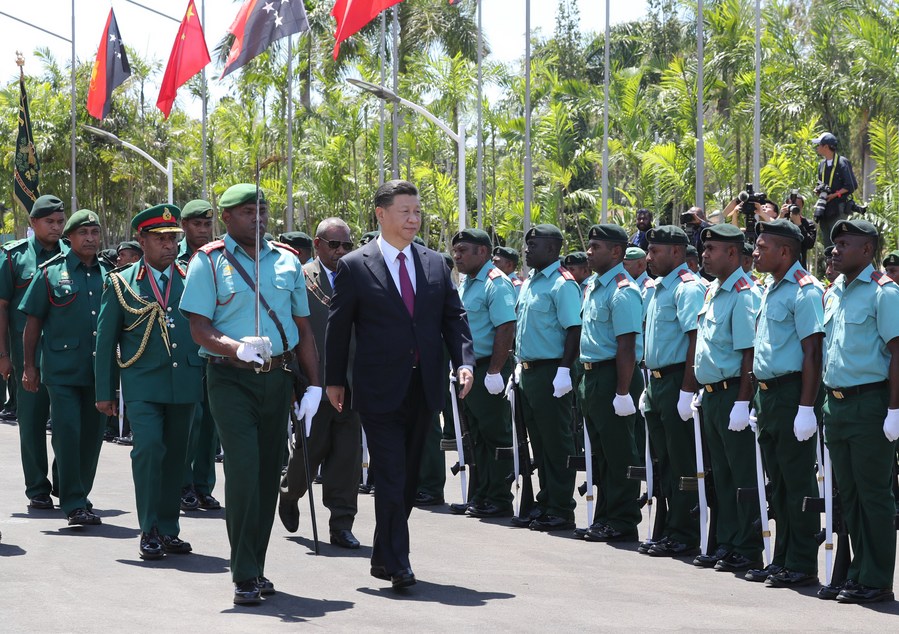BEIJING, Nov. 22 (Xinhua) -- In today's Papua New Guinea, a particular breed of grass from China recommended by President Xi Jinping two decades ago is flourishing on the exotic soil.
By 2018 when Xi visited this Pacific country, the grass was helping lift 30,000 local people out of poverty.
Juncao, which literally means "mushroom" and "grass," can be used, as its name suggests, to grow edible mushrooms, as livestock feed or as a green barrier to stop desertification.
As noted by the UN, its real power comes from how these activities contribute to broader social issues such as poverty eradication, clean energy, and other targets listed in the UN's 2030 Agenda for Sustainable Development.

Papua New Guinea (PNG) Governor-General Bob Dadae holds a grand welcome ceremony in honor of Chinese President Xi Jinping in front of the PNG national parliament house prior to their meeting in Port Moresby, PNG, on Nov. 16, 2018. (Xinhua/Ju Peng)
It is no wonder that this plant cultivated by Chinese scientists is often called "magic grass." However, it would have never been introduced to the world without the support of President Xi.
In the mid-1980s, when Xi started working in Fujian Province, he dedicated considerable energy to rural development and poverty alleviation.
At that time, mushroom farming was booming in the countryside, and it was lucrative. In a vicious cycle, farmers, felling trees en masse for fungi substrate, were causing deforestation, which caused economic stagnation. A potential solution, the future president of China discovered, could be found in a research underway in Fujian on a group of wild grasses.
"In this matter, I speak frankly from the bottom of my heart. I am very grateful and extremely thankful to the former governor Xi for his support of science and technology," said Lin Zhanxi, inventor of Juncao technology.

Lin Zhanxi, a professor at Fujian Agriculture and Forestry University, lectures on ecological management technology of Juncao grass to African students in Fuzhou, southeast China's Fujian Province, Aug. 12, 2021. (Xinhua/Lin Shanchuan)
"Because of his assistance, we would build the Juncao science laboratory, the first of its kind in Fujian Province, the country, and the world," he said.
Lin went on to develop 45 varieties of Juncao, which are used to cultivate 55 mushroom species. The grass significantly lowered farming costs, and reduced annual tree clearing by 20 million cubic meters.
Shortly after its application, Juncao technology was selected by Xi as part of a poverty alleviation initiative under which Fujian would provide assistance to its sister region Ningxia Hui Autonomous Region.
In Xihaigu of Ningxia, an area declared "uninhabitable" by the UN World Food Programme, the first 27 farmers to join the Juncao program quickly doubled their incomes. Ten years later, there were 17,500 Juncao farmers across the region, each taking home over 700 U.S. dollars more each year.
Juncao technology has been applied in over 500 counties across China.

Aerial photo taken on July 25, 2020 shows a view of a Juncao field in Pingtan County, southeast China's Fujian Province. (Xinhua/Lin Shanchuan)
Much like the way it revived millions of farmers' lives, the grass transforms once-bleak landscapes. In a desert on the upper reaches of the Yellow River, the tenacious grass turned desert into an oasis.
And these changes are not just within China's borders.
For many underdeveloped countries, Juncao technology is an affordable, accessible, and environmentally sound way to generate much-needed opportunities.
"It is a good initiative by President Xi Jinping. With the invention of the Belt and Road, and using Juncao technology, we can be able to improve the ecology and poverty alleviation and even to control the food security," said Lawandi Ibrahim Datti, a Nigerian student in Fujian.
From the island of Fiji to landlocked Rwanda, from the jungles in Brazil to the desert in Jordan, Juncao has now taken root in 106 countries around the globe. ■




